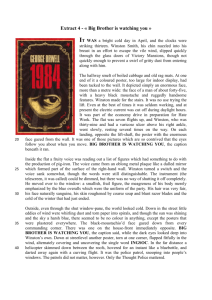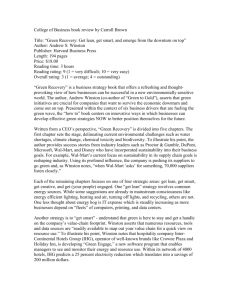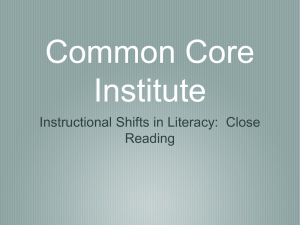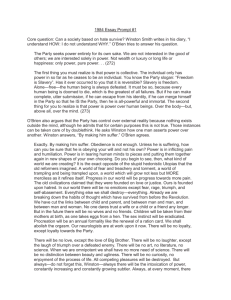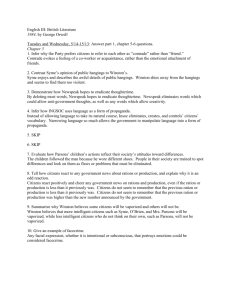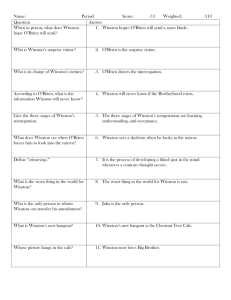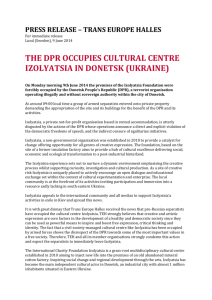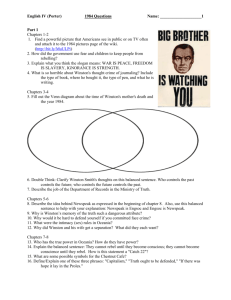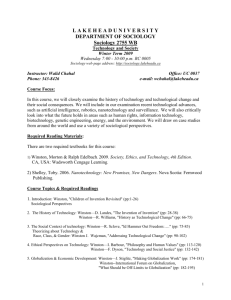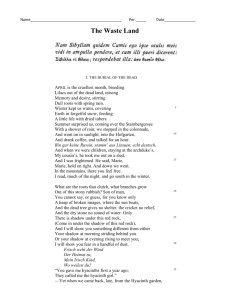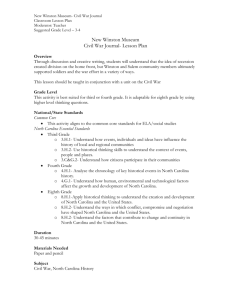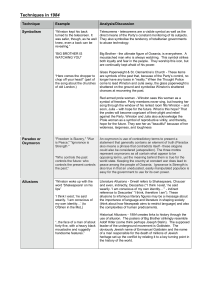Analysis.Chapter 2
advertisement
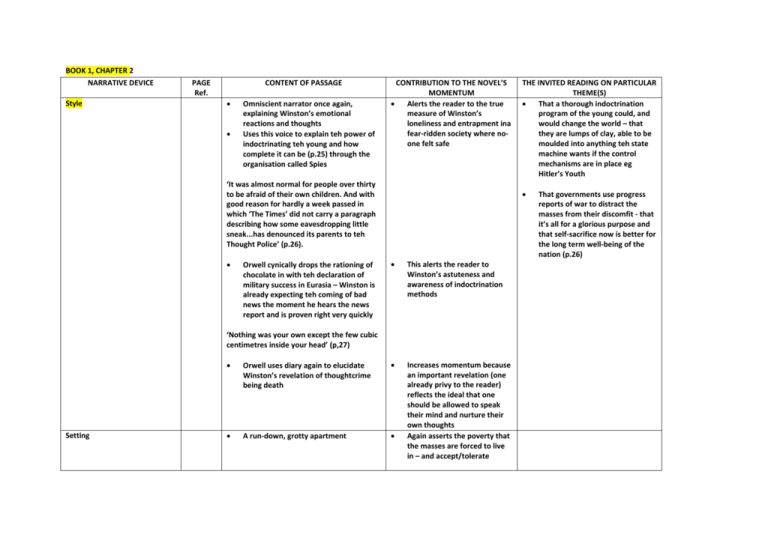
BOOK 1, CHAPTER 2 NARRATIVE DEVICE Style PAGE Ref. CONTENT OF PASSAGE Omniscient narrator once again, explaining Winston’s emotional reactions and thoughts Uses this voice to explain teh power of indoctrinating teh young and how complete it can be (p.25) through the organisation called Spies CONTRIBUTION TO THE NOVEL’S MOMENTUM Alerts the reader to the true measure of Winston’s loneliness and entrapment ina fear-ridden society where noone felt safe ‘It was almost normal for people over thirty to be afraid of their own children. And with good reason for hardly a week passed in which ‘The Times’ did not carry a paragraph describing how some eavesdropping little sneak...has denounced its parents to teh Thought Police’ (p.26). Orwell cynically drops the rationing of chocolate in with teh declaration of military success in Eurasia – Winston is already expecting teh coming of bad news the moment he hears the news report and is proven right very quickly This alerts the reader to Winston’s astuteness and awareness of indoctrination methods Increases momentum because an important revelation (one already privy to the reader) reflects the ideal that one should be allowed to speak their mind and nurture their own thoughts Again asserts the poverty that the masses are forced to live in – and accept/tolerate ‘Nothing was your own except the few cubic centimetres inside your head’ (p,27) Setting THE INVITED READING ON PARTICULAR THEME(S) That a thorough indoctrination program of the young could, and would change the world – that they are lumps of clay, able to be moulded into anything teh state machine wants if the control mechanisms are in place eg Hitler’s Youth Orwell uses diary again to elucidate Winston’s revelation of thoughtcrime being death A run-down, grotty apartment That governments use progress reports of war to distract the masses from their discomfit - that it’s all for a glorious purpose and that self-sacrifice now is better for the long term well-being of the nation (p.26) Motif Characteristation Plot p.24-25 The Party slogan trickled back into Winston’s mind: War is peace Freedom is slavery Ignorance is strength Winston is portrayed as a brave and intelligent man, unwilling to secede to a dominant government who wants to control all human beings Using faulty plumbing, Orwell introduces the audience to Winston’s next door neighbours, a poor family with a doting Big Brother Patty member and equally fanatical children that Winston feels nervous around The boy attacks Winston and hurls the insult of ‘Goldstein’ at him Orwell introduces the brutality of Big Brother through the hanging of the Eurasian soldiers and the children chanting about witnessing the hanging – a popular spectacle Winston returns his diary to the drawer but adeds a piece of white powder to teh corner to alert him to any interference should it occur Winston suddenly recognises himself a dead man This adds momentum to the novel because it again shows that even a nine year old is capable of destabilising an adult’s demeanour as well as threaten the life of a person, even an adult, such is the level of fear Innocence and peace have been stripped from even the innocent This adds to teh momentum of the novel because it attacks even the innocence of children, which serves to further shock the reader into desiring to know more Arouses sorrow in the reader for Winston –a s well as a sense of helplessness – the system is just too big and powerful Possibly that the more oppressed and repressed a society becomes, the more immoral and aggressive they become in asserting their own moral beliefs eg Stalin and Hitler Perhaps a statement on teh perceptive intuition of the young and the power of indoctrination of the young Children were often so horrible that even mothers were afraid of their children lodging charges of treason against them
